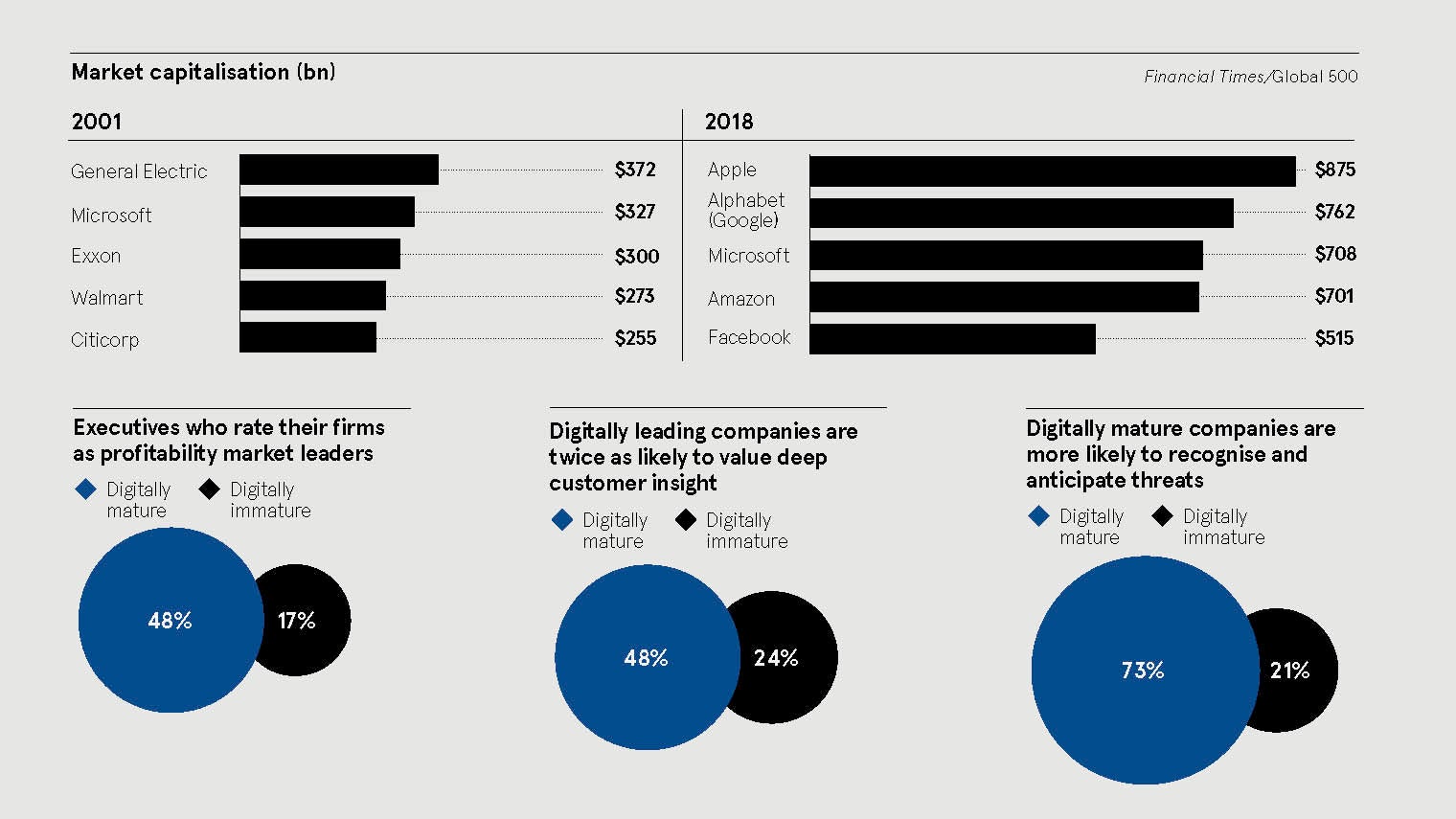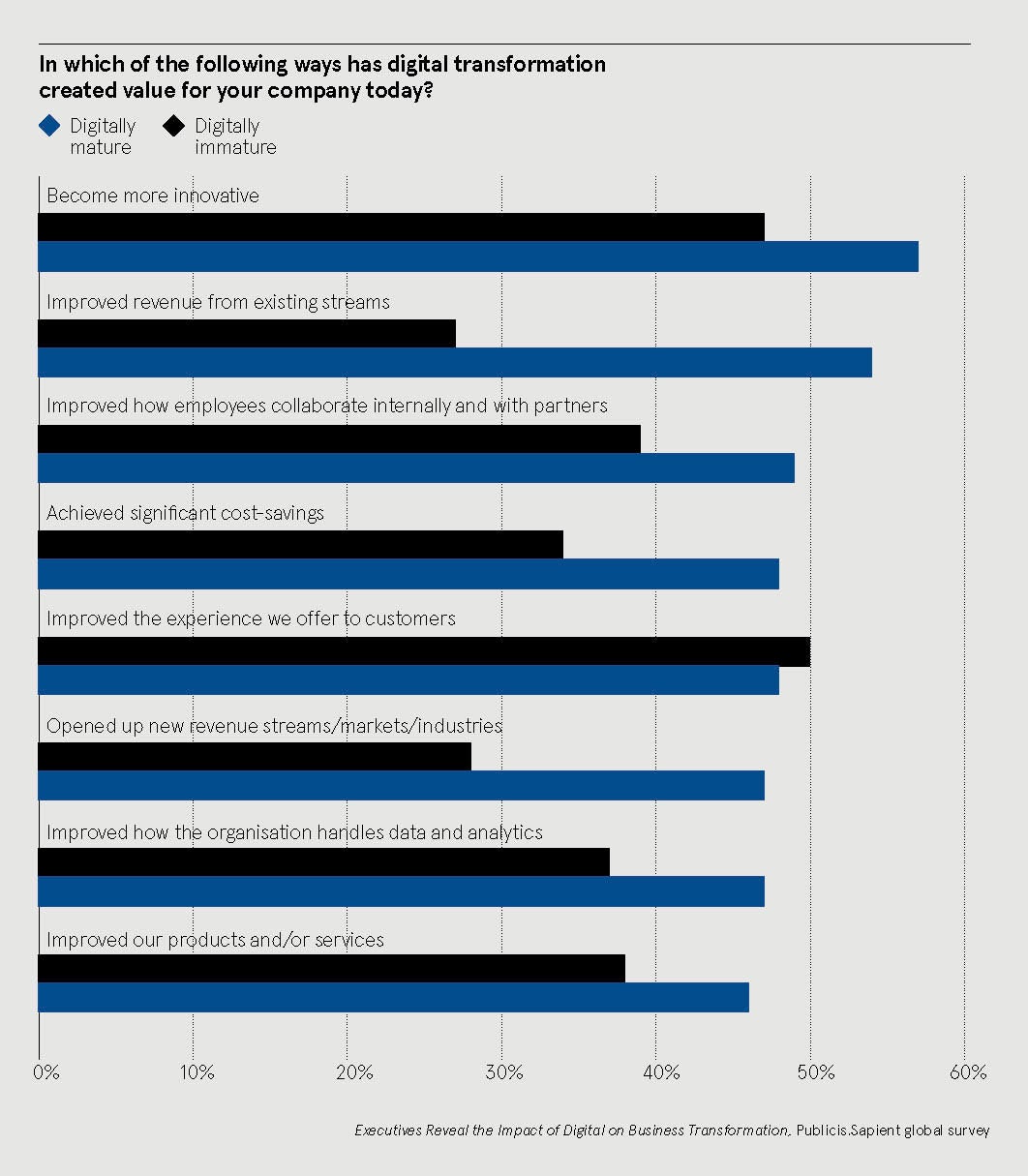
Nigel Vaz, chief executive, Publicis.Sapient International
Software is eating the world,” wrote Marc Andreessen in The Wall Street Journal. The entrepreneur and software engineer made his observation in 2011; today almost every aspect of commercial organisations – what they are and what they will become – is driven by technology.
“Businesses have been transforming forever, but there are two new factors influencing the speed of change,” says Nigel Vaz, chief executive of Publicis.Sapient International. “The first is the accelerated rate of change of consumer behaviours and expectations. The second is the rate of change of technology or the digital element of business transformation.
“Whereas technology was once the preserve of the IT department, and cost and risk were the priority, now technology is integral to and powers every part of the organisation. As a result, it is on the agenda of the CEO and C-suite instead of isolated to IT.”
Transformation and the capability to deliver it require businesses and leaders to regard change as much more than a project with a starting point and a completion.

“Amazon is constantly evolving – is it a bookseller, a retailer, a media company, a logistics disruptor or the largest provider of cloud services?” says Mr Vaz. “Amazon is defined not only by what it does, but also how it does it. It has built capabilities to power its own business, for instance AWS to power its commerce platform, and has turned that into a business itself. How it quickly stands up and then monetises these capabilities is a core skill, one which more traditional organisations need to understand and to adopt.”
Traditional companies and industries are increasingly being disrupted by nimble and digital-first entrants. While this is true across all sectors, the disruption can come in different forms from processes such as manufacturing, to products and services. If companies do not evolve their businesses and put digital at the core, they could see themselves surpassed by digital leaders.
If companies do not evolve their businesses and put digital at the core, they could see themselves surpassed by digital leaders
Many of the top companies of yesterday have been overtaken by those that put digital at the core. Look at a comparison of the top five US companies by market capitalisation in 2001 and today.
Publicis.Sapient has been helping to build digital businesses for almost 30 years, and has fundamentally changed many industries through the launch of some of the first internet banks, stock trading platforms and the largest retail commerce platforms. It helped to create online seat selection tools for airlines, which became one of the biggest drivers of cost reduction at the time and now represent the airline industry’s second biggest revenue generator after air fares.

Publicis.Sapient partners with clients on their digital business transformation (DBT), an approach that begins with identifying how to create value for consumers and the business, and prioritises what will most materially impact a business. The second stage of the DBT approach focuses on how to unlock that value using digital capabilities.
In the instance of airline seat selection, the clear value identified both to customers and to the enterprise required adjustments to many systems and processes. DBT requires the transformation of both the front stage, which is exposed to customers, and the back stage, underpinning business infrastructure and operations.
“Some companies identify opportunities for disruption, but then fail to realise how they’ll go about delivering it,” says Mr Vaz. “Others are so mired in the how of a change that they are unable to evolve the business to ask the bigger question of the what.”
He contrasts two of Apple’s bosses. “Steve Jobs was a transformational CEO whereas Tim Cook is a more traditional CEO. Cook is the kind of boss that most companies have – someone who is great at running the organisation. But the more transformational CEO is focused on how the company will create value for consumers and pushes it to achieve that. The organisation needs both skillsets – the vision and the roadmap to get there.”
There are companies that “disrupt” in contrast to those that “differentiate” and “defend”, explains Mr Vaz. “If we look at the German automotive industry, it is differentiating on the traditional combustion engine alone. These carmakers pioneered it and it is their focus; they’re using it to defend themselves against the disruptors.
“Tesla, on the other hand, might not yet have the production capabilities and the scale, but it has put a marker in the sand to say, ‘This is how we think that the automotive sector will evolve’. It is a future that is less about the hardware of the car and more about the car becoming a platform through which companies can differentiate themselves.”
In research conducted by Publicis.Sapient in partnership with the Fortune Knowledge Group, nearly three quarters of digitally mature organisations say it is likely or very likely that the leader in their industry will be a digital disruptor within the next five years.
Many companies look to external partners to help with their business transformation, sometimes due to lack of internal capability, but more often because, while they are highly effective at their core business, it is a significant challenge for them to reimagine the future of their business and industry.
An approach that puts the customer at the heart of everything that a company is and does, starting with customer needs, will enact change that has the greatest impact on value to the customer and for the business.
Digitally mature organisations are twice as likely as their immature counterparts to point to deep customer insight as the most important factor driving success of their organisation’s digital transformation strategy, according to the Publicis.Sapient and Fortune Knowledge Group research.
The “how” should become the “what” of digital transformation, Mr Vaz argues. “You need to think about how you view organisational models, culture, processes and policies, and how you measure results. It’s important to create a culture of continually unlocking value by consistently evolving. Even if you make the wrong choices about where you’re going, you need to be able to move beyond those mistakes as part of your evolution.”
He believes that the leaders of companies need to adopt a culture of constant digital transformation. “They need to think about it as a journey rather than a destination,” he says. “That’s what’s so exciting about it.”
For more information please visit publicis.sapient.com






